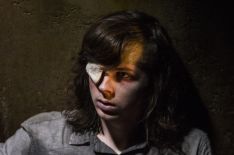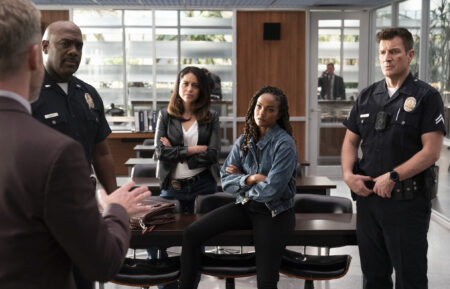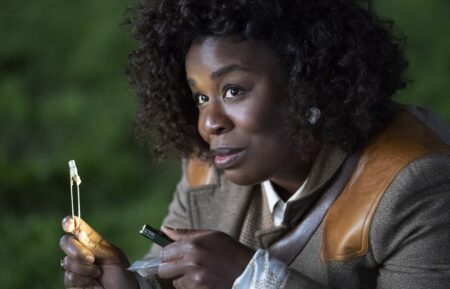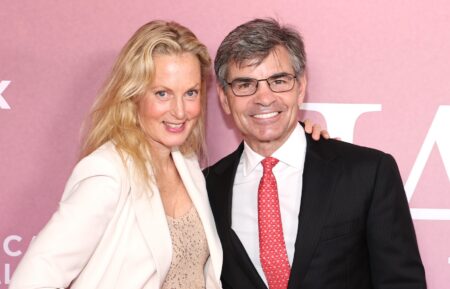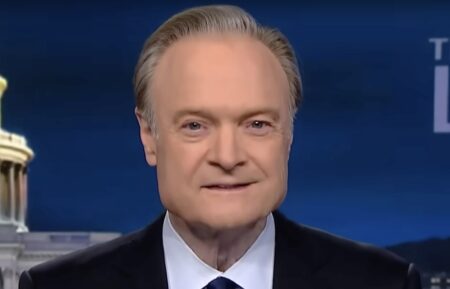‘McMafia’: We Talk AMC’s New Gangster Tale With David Strathairn and Juliet Rylance
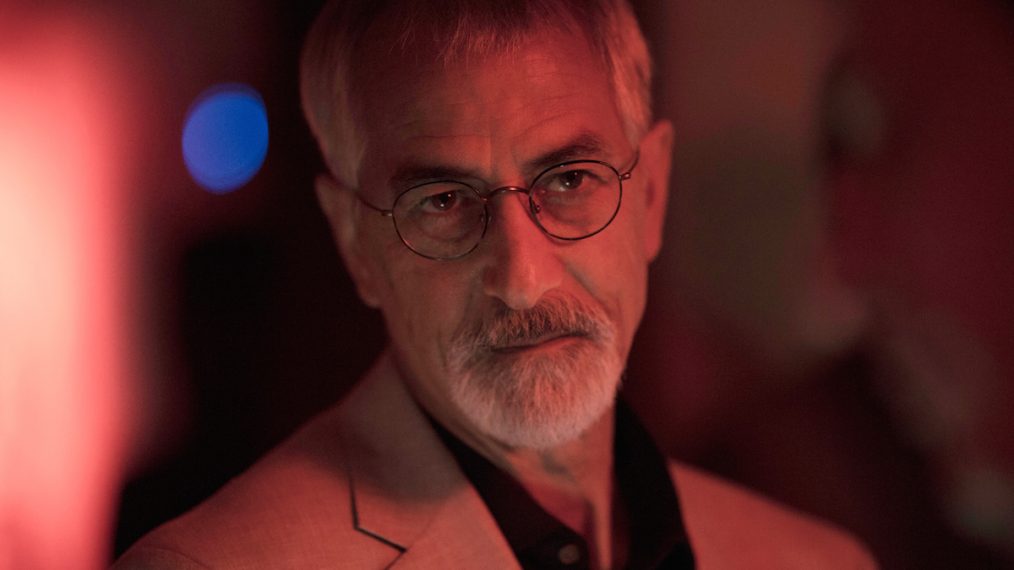
Inspired by Misha Glenny’s ambitious 2008 examination of organized crime, AMC’s atmospheric McMafia is the story of what goes down when an above-the-board member of a Russian gangster family must choose between his own morals and his loved ones’ survival.
Handsome young banker Alex Godman’s (Flatliners’ James Norton), the U.K.-raised son of Russian exiles, has crafted a tasteful and upwardly mobile life with his girlfriend Rebecca (Juliet Rylance, so good in The Knick) who also works in the financial world. But when his fledging hedge fund begins to wobble, Alex is unwittingly drawn back into his family’s shady affairs—and then all-out war with mobster, Vadim Kalyagin (Merab Ninidze). Alex thinks he has an ally in the cause in Semiyon Kleiman (David Strathairn), a Russian exile-turned-Israeli citizen who made his fortune in the shipping and entertainment industries with past ties to Kalyagin.
“I read Misha’s book, which was about how crime reinvented itself, and it seemed to be led initially from Russia after the fall of communism,” said McMafia co-creator Hossein Amini at a recent press event. “But also [about] how it spread globally and what became of this sort of multi-headed hydra. That it was suddenly beginning to take in governments, intelligence agencies, lawyers, PR agents, and its reach spread and became part of our world. That’s what I find really exciting about the series is to show that, in its new form, organized crime is all around us. It all sort of started with the fall of communism.”
TV Insider sat down with Rylance and Strathairn to talk about their characters and the globetrotting tale.
High-level familial corruption and Russia affairs are front mind for a lot of Americans right now. How do you think U.S. audiences are going to react to this story? Will there be some education or catharsis — or is it just engrossing, James Bondesque entertainment?
David Strathairn: I don’t think there’s going to be much of a catharsis, but there will be a revelation, and it’s not limited to a Russian perspective, a Russian/U.S. perspective at all, because there are so many other players implicated in the world. Czech Republic. India. My character is an Israeli citizen who has a rather reputable job in the government. There’s the British, Russian, Argentinians. It takes a lot of prisoners, so to speak, and it’s not a particular focus on, “Oh, Russians are the main bad guys”—although the families and James’ character were from there. But by no means is it a singular indictment of any particular country.
So it’s just going to be a good, in-depth, smart thriller?
Strathairn: Exactly.
Juliet Rylance: American audiences, I think—I hope—are going to be really interested in seeing the underbelly of corruption around the world—corruption that we’re all aware is there. We’re aware that these things are happening, corruption in boardrooms and at very high levels of financial institutions. I think people are going to be excited to actually see that being played out.
Strathairn: You’re right. We’re somewhat all aware of it, because the world of information is becoming more and more transparent, social media being a main player in that—Twitter or whatever. I think just below the surface, there is an awareness, especially in this country, that there are darker forces at work that are very closely aligned to our daily lives. Maybe some people will say, “Oh, finally we’re shining a light on this,” and others will say, “Really?” That’s what’s really deft and incisive about this show, is that it’s seemingly an everyday world that we are living in and accustomed to, and yet in the peekaboo, in the corners, there’s some pretty nefarious stuff going on.
Juliet, I loved you as Cornelia in The Knick—a savvy woman who was dealing with secretive men and secretive business. Rebecca is also a savvy woman in love with an accomplished man who may be leading her into turmoil. I get the feeling that she very much does know the man who’s next to her now, but that is about to change.
Juliet Rylance: [Laughs] Yes, very much so. What’s wonderful about the way that [co-creator] James Watkins and Hossein have written these scripts is that we come in, bang, right at the moment where everything begins to change. Up until that point, I think Rebecca and Alex have had a very close and honest and trusting relationship with each other, one based in excitement about doing things differently, about doing things differently than his family and the path that his family has taken. About being in the world in a more ethical and valued way.
The whole fabric of their relationship is based on that partnership. Very quickly, Alex is tested, to make a choice, to really put his family before, potentially, his own value system. That choice sets off a spiral of events in their relationship that make it a bit of a thrilling rollercoaster for Rebecca, trying to figure out where he is and where the man that she loves has gone.
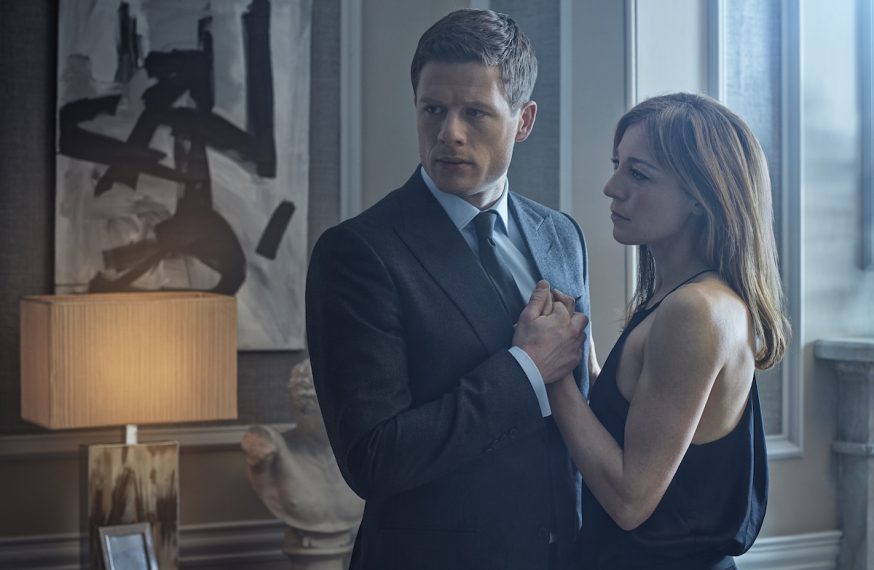
McMafia— Alex Godman (JAMES NORTON) and Rebecca Harper (JULIET RYLANCE) Photo: AMC/Todd Antony
Correct to assume that the interpersonal intrigue is every ounce as potent as the international intrigue?
Strathairn: I think that’s the most effective thing about this. There’s two characters, Oshri Cohen’s and Sofya Lebedeva’s characters, Lyudmilla [a vulnerable young Russian] and Joseph [Kleiman’s enforcer]. That’s a love relationship, and these are people who are pawns in the game, and yet they have a very sincere and potent relationship which is peripheral, seemingly, but is completely controlled by circumstances. The show always, ultimately, returns to the human element.
David, Kleiman seems like he actually has some useful things that he could teach Alex in his legit life, even though he may not have Alex’ best interests at heart. I don’t know how much you can give away about that, but is Kleiman specifically fostering this particular current with Alex to keep him in his thrall?
Strathairn: Exactly, yes. Semiyon is very clever, because he sees Alex’s expertise in his hedge fund, his financial management skills. If nothing, Semiyon is a chess player with dollar bills attached to each piece.
That’s his motivation, to compromise and capitalize based on financial dealings. Some are legitimate—casinos, shipping interests. You can hide a lot in the books there. But underneath, his motivation is to avenge or redeem his reputation in Russia before he was exiled by Kalyagin. He sees Alex as a device, as an opportunity to use as a tool in his own nefarious deeds.
Rylance: We are almost the two sides of Alex’s psyche or his dilemma—the two paths, as it were. There’s also this wonderful question that comes into the series quite quickly. Often we say we’re doing something for the love of our family or to protect our family—for a good reason, for a good cause.
But then there’s this other element, which is very Godfather-esque, that comes in, which is that power feels good. Living in a world like that, living in Semiyon Kleiman’s world more than Rebecca’s world, it’s a quicker payoff. It feels good. Rebecca’s world does not always feel good. It actually feels pretty lonely and stark, trying to do the right thing all the time.
I think that’s a question that all audiences will understand: What we choose to do and for what reasons, and how much we’re allowing ourselves to be ego-led into something that might not actually be the right thing for us.
Though this show may seem to skew male, the female characters are, thankfully, beautifully rendered.
Strathairn: The emotional ballast is held by three women. By Juliet’s character, by Sofya’s character, and by Alex’s mother Okasana.
Rylance: It’s very interesting. They’re so well-rounded. Masha [Alex’s ex], Alex’s mother, my character, Alex’s sister Katya, Lyudmilla—they’re all really beautifully-drawn characters. My relationship with all the women that I come across in this piece grows and changes in such wonderful ways.
There’s a beautiful arc between Rebecca and Alex’s mother, our relationship together, which I’m really grateful for. Rebecca doesn’t have a family in this piece, which is never really talked about. As much as she thinks Alex’s family is wild and crazy and out there, and she keeps them slightly at arm’s length, she also desperately wants to be part of a family and part of something that she’s never had. It’s a wonderful, complex situation between the family members and Rebecca—particularly Masha.
David, some reviews of the series’ BBC debut have said your character is based on an actual Israeli gangster named Ze’ev Rosenstein.
Strathairn: News to me! Had I known, I may have tried to get some image of the man or learn about him. So I sort of have to turn it over to James and Hoss on this one, and the way they presented him to me was very succinct. It’s in the script, even. They talk about this man who’s “The Cobra,” so that’s a pretty potent image to deal with.
In addition to being The Cobra, he’s politically savvy. He has no family to speak of. There are parts of him that are very specific, and I just sort of tried to weave them all together and present a discreet, but complex, person. The accent is difficult. You don’t want to be too Russian, not too Israeli. You don’t want to have it be jarring, but yet again, he’s an international character. And there are so many accents in the play. It just came down to Semiyon’s lifestyle. How he maneuvered through the world, and what that would take. How much do you give up? He’s sort of a cobra who can play chess.
McMafia series premiere, Monday, Feb. 26, 10/9c, AMC

